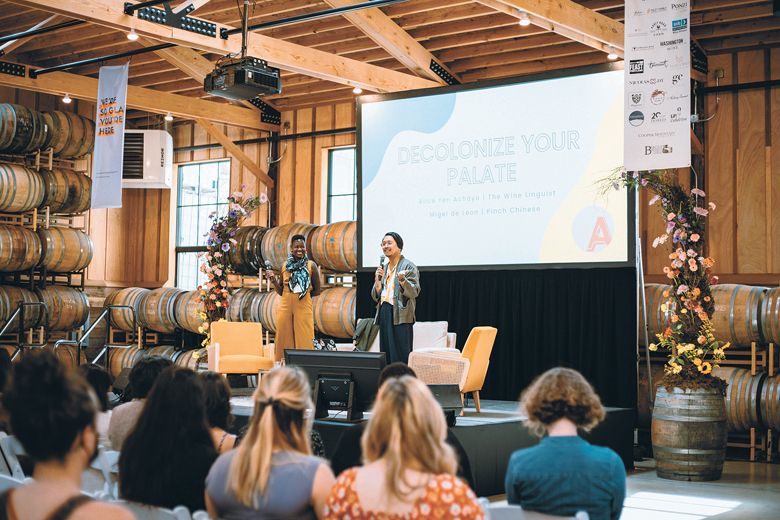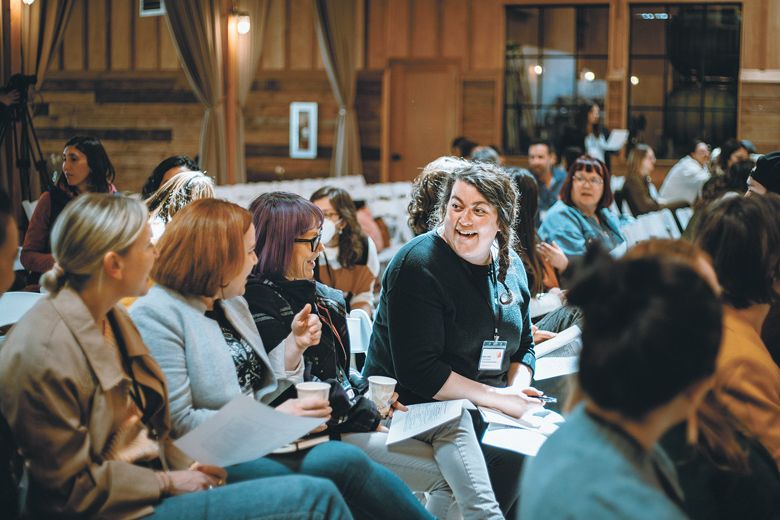Assemblage of the Masses
CREATING A MORE INCLUSIVE WINE WORLD


Immediately upon entering the stunning barn conference room at Abbey Road Farm Winery for Assemblage Symposium 2022, I was struck by a feeling of singularity. Diverse and different people— probably 250 over the two-day affair—all shared a commonality; the wine industry and their role in it.
This was not an ordinary wine business conference, but instead a ‘shake ‘em up, teach something new and anticipate change’ event. One which unites people working in vineyards, tasting rooms, or cellars, along with winemakers, winery owners, wine sellers and even those following how the wine industry adapts to change in the world. Whether buying habits, climate change, marketing changes or, in the case of Assemblage, movement of our beloved industry to be more inclusive, fostering a place for everyone in the business of making, selling, and consuming wine.
“I founded Assemblage after a ten-year career in direct-to-consumer wine sales and marketing. As a queer woman living and working in rural Oregon, I experienced plenty of discrimination at work,” says Assemblage Symposium founder Rachel Adams. “As a white-identified person, I knew my wine industry colleagues of color were experiencing oppression on a much higher level and with greater intensity. Assemblage offers a safe place to gather and fortify one another. Not just diverse wine professionals, but the greater wine community, are provided tools and networks to build a more equitable future.”
Diversity, Equality and Inclusion, or DEI, is a fiercely-held principle of Assemblage’s participants, presenters and speakers. What does an inclusive wine world look like and how do we create it? Attendees were a cross-section of BIPOC, Queer, Latinx, Transgender personalities with jobs in management, consulting and some—like me— there to learn. As a white female, I have, from time-to-time, felt discrimination but nothing like most of my fellow attendees.
I could feel my understanding changing. There is room for everyone at the wine bar, including those out in the vineyards, often referred to as ‘workers.’ Stewards of the land is a more descriptive and accurate term. As I spoke with longtime winemakers, it became clear that without those stewards, consistency and quality in winemaking is unobtainable. Sadly, these stewards are often marginalized, not celebrated. A panel, led by Sofía Torres-McKay of Cramoisi Vineyard, discussed an educational program called Asociación Hispana de la Industria del Vino en Oregon y Comunidad, or AHIVOY. Her guests: vineyard stewards who had completed the curriculum in order of actively advance their careers in the industry.
“AHIVOY strengthens the Oregon wine community by empowering vineyards’ stewards through education” is the organization’s mission. Core values include empowerment, respect, integrity, advocacy and community; all worthwhile goals for any DEI program.
Remy Drabkin, mayor of McMinnville and owner/winemaker at Remy Wines, profiled in this issue, agreed. “It takes very little to change language, but it is impactful. We are learning and listening. There has been shame associated with DEI work, a fear they have done something wrong,” says Drabkin.
She continued, “I feel the Assemblage Symposium has been one of the most dynamic coming togethers of the wine community really, the most compelling wine event I have probably ever attended. The presenters and their expert levels of experience was not entry level and the fluency of information in and out was phenomenal.”
Drabkin also felt there was many instances of ‘I feel like I finally found my people in the room, and that is powerful. “In major wine growing regions, the wine industry touches everything and has sway and influences direction. Assemblage Symposium acted as a resource center for those who want to make changes in their community,” Drabkin concluded.
“This year, we particularly wanted to highlight the concept of ‘doing the work’ of DEI. Many of us know this phrase as a descriptor of everyday acts of anti-racism, but we wanted to show the wine community first, what ‘the work’ really looks like, and second, that it doesn’t have to be painful,” explained Assemblage founder Adams. “In fact, it can be really joyful! Our speakers were so brave in sharing personal lessons they learned when they made mistakes in the past. They shared the concrete steps they took that led to deeper relationships and positive outcomes. It was beautiful to watch.”
Atticus Wine owner and winemaker Ximena Orrego, agreed. “The Symposium was thought-provoking and inspiring. A reminder that we need to continue to keep an open mind, actively listen and make sure all voices are being heard and included. It certainly left me evaluating what else I can do as an individual, as a parent and as a member of our community and our industry. It was great to see so many people I had not seen in so long or that I had only met via zoom during the pandemic!”
The initial day of the conference concluded with the first ever Diversity Wine Classic. Featuring winemakers and representatives from diverse backgrounds, all pouring wines as unique as the audience. “After a prolonged period of isolation for our community, it was important to us to offer a restorative in-person experience, but video recordings of all sessions will be available via our website soon for those who were unable to join us.”










